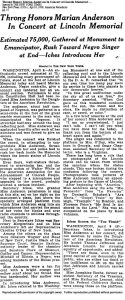Welcome to Cohen Quest! In the very first installment, I have some exciting letters, telegrams, and newspaper articles to share and discuss that solidify our guy Chas’s1 place in history. Spoiler alert, it has to do with Marian Anderson’s Lincoln Memorial Concert; but you already knew that, didn’t you? You’re so smart.
I should start with an explanation of what the Cohen Quest series is: last year, I received the art song “Epitaph for a Poet” composed by a Cecil Cohen. In doing my song research, I had extreme difficulty finding information on the composer besides two short biographies from the African American Art Song Alliance and the African Diaspora Music Project, respectively. This lack of information is indicative of a greater issue: composers of color are often left out of history, their stories forgotten and pushed to the side. Who was this man who composed a “deceptively simple”2 but absolutely gorgeous piece? And why is it that I, an undergraduate vocal performance major in Minnesota in 2021, am seemingly the first person to try to piece together a narrative of Cohen’s life? This series, I hope, will get to the bottom of both of these questions. So let’s get started before I hit the word count!
Dorothy Maynor sings Cohen’s “Epitaph for a Poet” live at the Library of Congress, accompanied by Arpád Sándor.
On April 9th, 1939, the very famous contralto Marian Anderson gave a concert on the steps of the Lincoln Memorial in Washington, DC.3 The story goes, after being denied access to Constitution Hall because she was black, Secretary of the Interior Harold Ickes invited her to perform in front of the Lincoln Memorial, an extraordinarily high honor even for a celebrated singer like Anderson. What does this have to do with Cecil Cohen, you ask? Well, at the time, Cohen was the chairman of the Howard University Concert Series, and therefore in charge of organizing and producing Marian Anderson’s concerts in Washington, DC, and therefore directly involved with one of the largest classical music concerts in modern American history.4
 In early January 1939, Charles Cohen approached the manager of Constitution Hall, Fred Hand, inquiring about renting it for a concert on April 9th. Cohen was informed of two things restricting their use of the space: firstly, the National Symphony Orchestra was already set to perform that afternoon, and secondly, a 1932 DAR policy restricted use of the hall to white performers. Due to the enormous popularity of Anderson, Cohen needed to book an auditorium large enough to accommodate at least 1,500 people; outstanding circumstances prevented the use of other sizable auditoriums in the area.
In early January 1939, Charles Cohen approached the manager of Constitution Hall, Fred Hand, inquiring about renting it for a concert on April 9th. Cohen was informed of two things restricting their use of the space: firstly, the National Symphony Orchestra was already set to perform that afternoon, and secondly, a 1932 DAR policy restricted use of the hall to white performers. Due to the enormous popularity of Anderson, Cohen needed to book an auditorium large enough to accommodate at least 1,500 people; outstanding circumstances prevented the use of other sizable auditoriums in the area.
Cohen contacted the impresario and Anderson’s manager Sol Hurok about the issue who then contacted the DAR and was informed that Constitution Hall was available April 8th and April 10th.5 When Cohen again contacted Fred Hand to book the hall, Hand once again denied him, saying it “will not be available on either April 8th or April 10th for the Marian Anderson Recital.” 6 The reply is short and sweet, and it speaks to Hand’s dismissiveness and callousness in the face of mounting pressure to open the hall to non-white musicians. That March, several prominent members of the DAR, including Eleanor Roosevelt, resigned from the organization, further increasing the conflict’s presence on the national stage.7 Then Secretary Ickes stepped in and Anderson performed for thousands of people at the Lincoln Memorial and the day was saved.
A news clip from Marian Anderson’s concert on April 9th, 1939, at the steps of the Lincoln Memorial in Washington DC.
Obviously, the story is a little more complex than that, but we’ll save those primary sources for next time. The point is, there was an extremely important figure completely left out of the narrative to make a cleaner, more concise story; not to mention his exclusion from history as a talented and forward-thinking composer and pianist. Hopefully we’ll continue to uncover more secrets of Cohen’s life as the semester goes on, the guy certainly deserves it.
1 O’Day, Caroline. [Supporters [arranged alphabetically] M-W: O’Day, Caroline]. Telegram. Marian Anderson Papers (University of Pennsylvania). Colenda Digital Repository. https://colenda.library.upenn.edu/catalog/81431-p31g0hx4c (accessed September 27, 2021).
2 Story, Rosalyn M., [liner notes to] Dorothy Maynor, soprano, Historic Performances from the Library of Congress, December 18, 1940, compact disc, 16.
3 Special to the New York Times. Throng Honors Marian Anderson in Concert at Lincoln Memorial. Newspaper. New York: The New York Times, 1939. https://www.proquest.com/historical-newspapers/throng-honors-marian-anderson-concert-at-lincoln/docview/102759828/se-2?accountid=351.
4 Cohen, Charles C. [Howard University, 1939: Cohen to Hurok]. Letter. Marian Anderson Papers (University of Pennsylvania). Colenda Digital Repository. https://colenda.library.upenn.edu/catalog/81431-p3fj29g1s (accessed September 28, 2021).
5 Hurok, Sol. [Howard University, 1939: Hurok to Cohen]. Telegram. Marian Anderson Papers (University of Pennsylvania). Colenda Digital Repository. https://colenda.library.upenn.edu/catalog/81431-p3610vv2q (accessed September 28, 2021).
6 Cohen, Charles C; Fred Hand. Letter from Cohen (Howard) to Hand with his reply. Letter. Daughters of the American Revolution. NSDAR Archives Marian Anderson Documents January-April 1939. https://www.dar.org/sites/default/files/8_SCR_DAR%20Subject%20Files_Anderson%
2C%20Marian_February%208%2C%201939%20Letter%20from%20Cohen%20%28
Howard%29%20to%20Hand%20with%20his%20reply.pdf (accessed September 28, 2021).
7 Roosevelt, Eleanor. Letter of resignation from Roosevelt to PG Roberts. Letter. Daughters of the American Revolution. NSDAR Archives Marian Anderson Documents January-April 1939. https://www.dar.org/sites/default/files/12ABC_SCR_DAR%20Subject%20Files_Anderso
n%2C%20Marian_February%2026%2C%201939%20Letter%20of%20resignation%20fr
om%20Roosevelt%20to%20PG%20Robert.pdf (accessed September 27, 2021).
